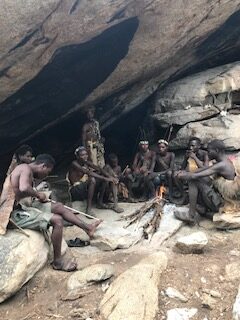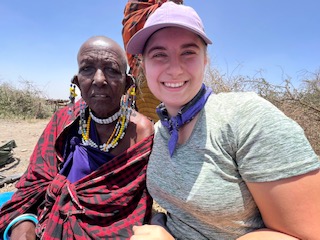
Throughout my time in Tanzania I have had the opportunity to meet and interact with several of the local tribes. There are some like the Iraqw whose culture has adapted to modern housing, jobs, and religions. When I had the opportunity to spend the day with an Iraqw family around Rhotia they showed me the old style of houses their family used to live in. Partially underground houses made of sticks and mud, now used for livestock, used to house large families. Now however, the tribe has spread out, frequently mixing with other local tribes, living in houses made of bricks and stone, and sending their children to higher education.
In contrast, the Hadzabe tribe is a bushland dwelling group of hunter-gatherer nomads who make their living through use of the natural land. They are one of the only tribes in Tanzania allowed to freely hunt most wildlife without a permit, as their way of life depends on it. Children in the tribe do not go to school, but are taught how to shoot a bow and arrow from a young age. When we went to visit we were also taught how to shoot their longbows, but also how to forage for roots and some of the beautiful songs and dances of the tribe.
The Datoga are sustainable blacksmiths, taking found metals and recycling them into beautiful pieces of jewelry, arrow heads, and spears that they supply to other local tribes.
There are also the Maasai, nomadic pastoralists who depend on cattle for income and feeding their families. We spent a whole day with the Maasai learning how to build houses and fences, milk goats and tend livestock, and also how to make the jewelry that they sell to tourists. The thing that many of the tribes have in common is their dependency on tourism as an outside source of income. Along with our visits we held interviews with members of each of the tribes, learning about how they use the land, how they deal with human-wildlife conflict, and if they believe the government and NGOs are providing enough support to their communities.
I truly believe that learning about other cultures and ways of life is essential to becoming a better global citizen, but I also think that beyond observing, it is crucial to actually speak to members of the community. It is the best way to learn about their struggles and needs but also how they have adapted to their environment and living alongside wildlife, and I am so glad that I got to have these experiences this semester.

